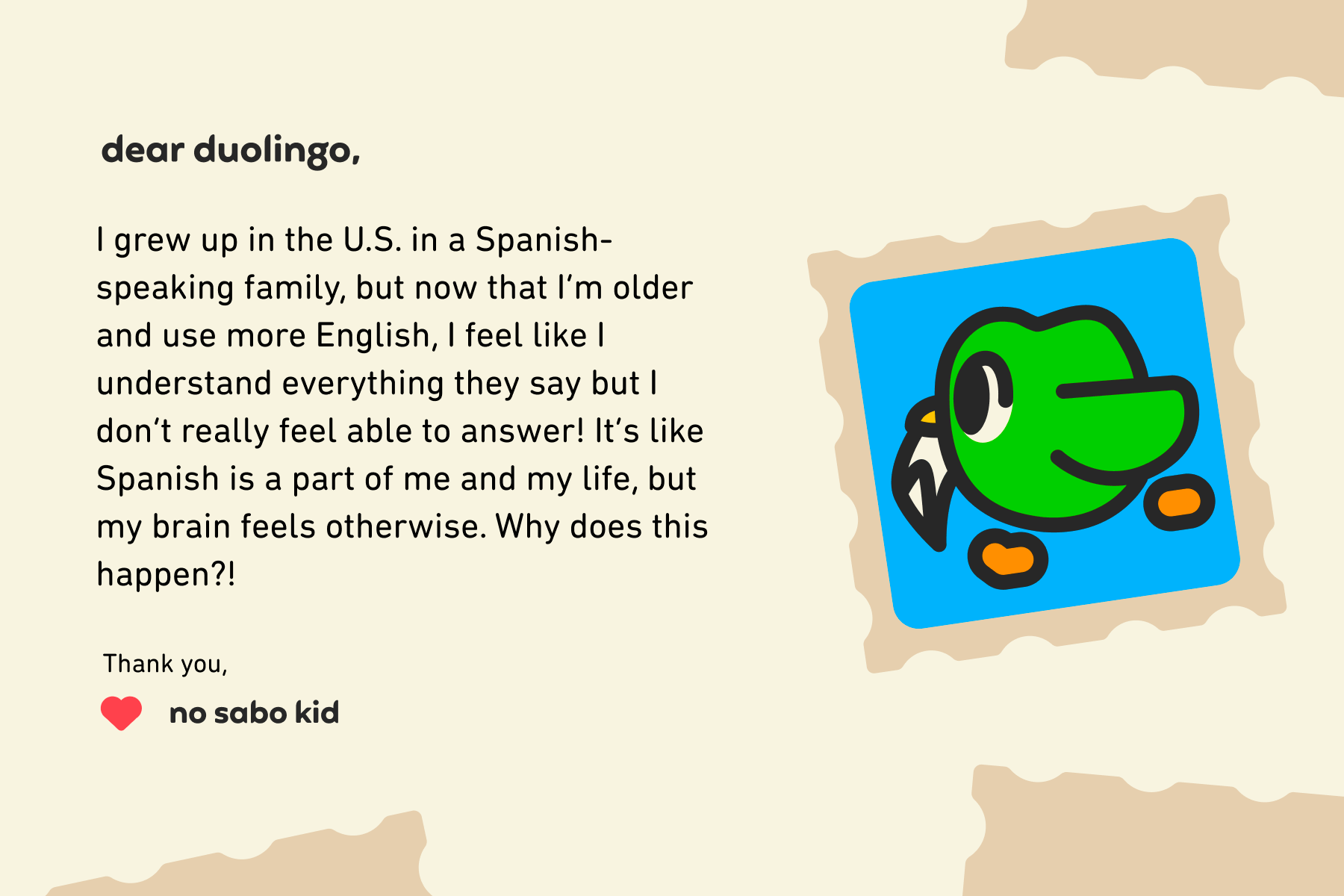Welcome to another week of Dear Duolingo, an advice column just for learners. Catch up on past installments here.
Hi there, learners! This week’s Dear Duolingo is brought to you by Dr. Danielle Dionne and Elisa Camps Troncoso. Danielle is a learning scientist who works on Stories and DuoRadio and is a heritage French speaker! (More below on what that means.) Elisa is a learning designer, and she leads the team responsible for our Spanish course for English speakers. Before coming to Duolingo, Elisa was a Spanish instructor and so used to interact with many different types of learners… including the learner whose question we’re answering this week!
Our question this week:

No Sabo Kid, it sounds like you’re a heritage speaker! And you’re not alone: There are millions of heritage speakers around the world and many who feel just like you.
Often, the home language is referred to as their “heritage” language as it is a direct link to their cultural and familial roots. For example, about 70% of Latinos in the U.S. use Spanish at home! Some of these heritage speakers have branded themselves as “No Sabo” kids, reclaiming what used to be an insult, in a movement you may have seen on social media (like in this example and this one, too). The name is based on the Spanish expression No sé (I don’t know). Sé comes from saber (to know something), but if you didn’t know it was an irregular verb, the expected conjugation would be sabo! This movement draws attention to heritage speakers’ unique situation when it comes to language and culture.
Spanish in the U.S is a great example of a heritage language, but there are many more: There are heritage speakers of Portuguese, Dutch, French, Russian, Arabic, Korean, Chinese, and many others in the U.S alone!
Heritage speakers are important members of both cultures, and their language abilities represent their status as bridges of their communities. Let’s debunk some myths about heritage speakers.
Myths about being a heritage speaker
There are plenty of feelings and attitudes about what it means to be a heritage speaker, why they speak a certain way (or don’t), and how they “should” be speaking or acting. Have you ever heard these misconceptions?
“Heritage speakers don’t know how to speak correctly!”
Learning two languages at the same time absolutely impacts how our brains categorize and store language information, but this difference does not mean that heritage speakers use their heritage language in the “wrong” way. In fact, language rules around what’s “correct” or “incorrect” are completely arbitrary. Not to mention that many heritage speakers mix their languages in a unique, systematic way called codeswitching (like Spanglish!).
“Heritage speakers aren’t really part of the culture if they don’t know the language!”
There is a lot of conversation around heritage speakers growing up in between two cultures: They’re not fully part of their heritage culture because they live in a different place, but they also might not feel fully part of (or welcomed by) the larger community, either. But immigrants bring their language and culture with them to a new place—so No Sabo kids really do have thorough knowledge and experience with both! They’re often even described as having a third culture: their unique blend of the heritage culture, the surrounding culture, and the one they develop as bridges between them!
“Speaking two languages at home is confusing for a kid!”
It is very common for heritage speakers to be discouraged from using their heritage language at home because it’s thought of as confusing or harmful to academic success. But, research suggests the opposite! Our brains are flexible and capable of switching between languages regardless of age.
So what is it really like to be a heritage speaker?
Realities of being a heritage speaker
This specific linguistic background gives heritage speakers a unique position in their society—both linguistically and culturally!
Heritage speaker challenges
Of course—as all learners know—learning and speaking multiple languages is hard work, and it takes a long time to make progress and then keep it up. Here are some common challenges:
- Pronunciation is hard to master. Even when a bilingual person is speaking in just one language, they’re using information about sounds and pronunciation from both languages! (Actually, this challenge comes up with heritage speakers and non-heritage speakers alike.)
- Everyone’s a critic. Heritage speakers often receive criticism from both their communities: They don’t know “enough” of the heritage language or culture, but they know enough to make them different from the broader community. 🙄 This is frustrating for sure and often has less to do with language and more to do with power dynamics and feelings of belonging. The reality is that heritage speakers are part of a third culture—they’re a bridge between both communities!
- Language classes are designed for true beginners. Heritage speakers can feel out of place in language classes, since most courses don’t take into account the kind of knowledge heritage speakers already have about the language and culture. Luckily, many universities in the U.S. have started teaching language courses specifically for heritage speakers because they have different needs and move at a different pace!
Heritage speaker superpowers
There are also many ways that heritage speakers are in a league of their own!
- Grammar advantages. Heritage speakers are particularly savvy when it comes to understanding grammatical patterns. Knowing 2 languages can be a balancing act, but it’s also a superpower that helps heritage speakers draw connections and recognize patterns in a unique way.
- Understanding of multiple cultures. Heritage speakers have the unique ability to connect to more than one culture. Not only are they experts in the community culture, but they also grow up with their heritage culture. This helps heritage speakers connect to more people around the world, and it even allows them to bring parts of their heritage culture into their communities!
- Brain benefits of bilingualism. Experience with two languages strengthens your mental connection to both languages. This can help with overall cognitive abilities, such as memory.
Multiply your powers with multiple cultures
Being a part of two cultures is a superpower! No Sabo kids, like our reader this week, carry their cultures with them in all their communities, and you deserve a space in those cultures. Being part of multiple cultures means having the power to connect them together and create bridges between different communities!
For more answers to your language and learning questions, get in touch with us by emailing dearduolingo@duolingo.com.
